Places to Stay the Night Read online
Page 2
But nothing ever worked. Libby did not seem to notice him no matter what he did. She seemed special even then, apart from everyone else. Some guys called her the ice princess. Her hair was white-blond, her eyes pale blue, her skin fair, like someone from Sweden or Norway instead of Holly, Massachusetts. She got her clothes at Filene’s and Lord and Taylor’s in Boston, and everything matched just right. She had shoes and sweaters and pocketbooks, all the same color. She wore a silver charm bracelet with charms from a jewelry store in New York. They arrived, he later learned, tucked into a small velvet bag in a bright blue box. Tom used to get dizzy just sitting next to her.
And she still made him dizzy, even though they’d been married for eighteen years, and had two kids. Even though as time went on, she paid less and less attention to him and spent most of her time alone in her room. For the past year, she’d looked at him as if he were a stranger. When he spoke, she’d say politely, “My, isn’t that interesting?” or “Is that so?” Then she’d smile and go back to whatever it was she’d been doing—giving herself a manicure or facial, combing her hair, or just simply staring. His buddies used to say Libby Holliday had cast a spell on him, and Tom wasn’t sure they were wrong. Nothing she did could drive him away.
The summer after he’d graduated from high school, Tom left Massachusetts and hitchhiked around the country. He went as far south as Key West, as far east as Block Island, as far north as Canada, and all the way west to Los Angeles. He saw palm trees, redwoods, aspens, and birches. He saw both oceans and the Gulf of Mexico, skyscrapers, Dodger and Three River Stadium, the Liberty Bell, the Grand Canyon, and the Golden Gate Bridge. And the happiest part of his trip was the day he got back home to Holly.
Libby wanted him to tell her every detail of his trip. “What did you see?” she kept asking. “What was it like?” He tried to explain how he felt about everything, how now that he’d seen the rest of the country he was somehow satisfied with himself, sure that there was no place he’d rather stay than right here, tucked in this small corner of the world. But Libby didn’t understand any of it. Even then she imagined that she did not belong in Holly, that her real life lay beyond it somewhere.
“We could go out there,” she told him. “To California or Arizona. We could start a life somewhere new.” Tom had laughed at the idea. “Why would we want to leave everyone we know? Our families, our friends. Everything.” He hadn’t wanted to sound afraid of the notion, but he was. He knew that part of what he’d missed out there was the familiarity of life in Holly. The smells, the feel, the sameness of each day here. He couldn’t tell her that he’d been frightened to eat alone, and usually bought fast food that he ate right in his car, with the radio on for company.
“We could have a front yard with cactus growing in it,” she was saying. “Orange and avocado trees. A pink stucco house.”
Those blue eyes of hers glistened while she talked. They looked off in the distance, at some future that Tom couldn’t even begin to see.
“Hey,” he’d told her, pulling her closer to him, “look at that moon.” He’d looked up at it himself, searching for the man in the moon’s face on its surface.
“Or we could live in a little house right on the beach in Florida,” she’d said, sounding almost desperate. “I’d collect seashells, and driftwood, and hang wind chimes to catch the ocean breeze.”
“You nut,” he’d laughed. “You read too much.” He’d tried to believe she was only dreaming about impossible things, the way he sometimes did. His crazy dreams had him driving a Porsche, or playing shortstop for the Red Sox. Things that he knew were never going to happen.
Even back before they were married, when she got pregnant and took off for New York City to have an abortion, he still loved her. He went after her and stopped her before she even reached the state line and let her cry and rant about how he had ruined her life by getting her knocked up. They had sat like that all night, in his car, and in the end they had driven into Boston and gotten married instead. Then he’d taken her to a Red Sox game, box seats. He caught a foul ball hit by Carlton Fisk that they kept on the mantel above their fireplace the way other people kept a wedding photo in a fancy frame. Only Libby would do something crazy like that. It was the sort of thing no one else knew about her.
That Saturday morning his daughter Dana walked in with her face all blotchy and red, Tom Harper considered himself the luckiest guy in the world. His house was a mess. His son was smoking dope. His wife was usually locked away in their bedroom. And he couldn’t be happier.
When Dana walked in, Jake Fontainbleu was working his way through a Boston cream doughnut and telling Mandy about his trip. Tom looked up from the map of Yellowstone when the bell over the door tinkled and saw Dana holding on to Sue’s kid Caitlin as if she’d fall over if she let go. He had one thought when he saw her: something bad had happened to Troy. A car accident. A drug overdose. Something real bad.
Jake was saying how his one kid wouldn’t get out of the car the whole time because she was so afraid of bears and Tom looked right at his daughter’s swollen eyes and said, “What? Tell me.”
It seemed like everybody stopped talking and stared at the two of them. Bad news hung in the air with the smell of motor oil and coffee.
“Mr. Harper,” Caitlin said, “I think you’d better come outside.”
He’d never liked Sue’s kid much. She was too skinny, and too bossy, a real wiseass. All of her clothes hung on her as if they were made out of old potato sacks or something. The kid made him squirm. But this morning, he listened to her and followed Caitlin and Dana outside.
Dana made him uncomfortable too. She looked just like him, a face that worked better on men, on him and Troy. He’d wanted a daughter just like Libby, blond and delicate. Beautiful. You’d never even know Dana had thick strawberry blond hair. She chopped it all weird, using his electric razor on the sides. Right now she’d shaved a peace sign on one side, some other blurry design on the other. A skull or something he couldn’t make out. It was hard to tell if she was a boy or a girl if you didn’t know. She always wore jeans. She never put on perfume or makeup. She was a real oddball.
“Dad,” she said, looking away from him.
Caitlin nudged Dana with her bony elbow but all Dana did was gulp as if she was drowning and needed air.
“Is he in the hospital?” Tom said. “Or is it worse than that?” He couldn’t bring himself to say the word “dead,” but it was right there on his tongue.
Dana looked at him, surprised. “It’s Mom,” she said. “She left us. She went away.”
“To Los Angeles,” Caitlin added.
Tom grabbed the edges of the hood of Gale Strand’s Impala. “Libby?” he said, to be sure he’d heard right. “Los Angeles?”
Dana started to cry, heavy sobs that shook her and made that peace sign on her head jump. “I always knew she’d do this,” she was saying.
Tom closed his eyes, trying to figure out exactly what had happened. But he could only think of one thing—how quickly luck could leave a person, how fast life could change from great to awful. And then he thought of something else: How could he live without Libby?
There were thunderstorms all that summer before Renata Handy took her daughter Millie and moved back to Holly, Massachusetts.
“The angels are bowling,” Millie would tell her.
“Angels don’t bowl,” Renata always answered.
But Millie’s faith in magic and angels could not be shaken. She was eight years old and still thought anything was possible.
“Some do,” she’d say. “Some play harps and some sing with beautiful voices—”
“Angelic voices, you could say. Right, Millie?” Renata tested her daughter constantly. She took her to science exhibits at the IBM building. She read to her from Discover and Psychology Today. She gave her facts, evidence, hard proof that there was no Loch Ness monster. No fairies. No angels bowling in the sky.
“Yes,” Millie said, sighing. “A choir of ange
ls—”
“Oh, no,” Renata groaned. “Now she’s quoting Christmas carols.” God was another thing altogether. She hadn’t even started on God yet.
Millie climbed onto her mother’s lap. She was a small child with a cloud of dark curls and deep-set blue-black eyes. Those eyes were the color of bruises. Bruises that were still tender, bruises that hurt. When Renata put her arms around Millie, she felt as if she was hugging a pile of pick-up sticks.
“Mama,” Millie said, pressing her head against Renata’s chest. “Angels are lovely.”
“Are they?” Millie’s hair tickled Renata’s chin, and she placed her large hand on top of her daughter’s head to flatten the curls.
Outside their window, thunder rumbled.
“They have long blond hair—” Millie said.
“What about the brunette ones? What about Chinese angels? Eskimo angels? They can’t all be blond.”
“And white silk robes and big gold wings.” Millie stretched her arms up high to show just how big their wings were. Then she faced her mother and made a circle with her hands. She held the circle over Renata’s head, straining to reach. “And they have a shiny gold plate right here. Over their heads.”
Renata laughed. “It’s not a plate, Mill. It’s a halo.”
Millie did not let her hands drop. She narrowed her eyes. “If there are no angels, how come you know that?”
The thunder roared again, rumbling and cracking and shaking the windows.
Millie dropped her hands and smiled. “Sounds like a spare to me,” she said.
Renata Handy was thirty-five years old and she felt as if she were twice that. She had left Holly for New York City the day after she graduated from high school. She packed all of her belongings in a laundry bag shaped like a smiling hippopotamus. The bus ride took four hours, but to Renata, it had seemed more like a ride on a spaceship, as if she had landed on the moon, or Mars. Or any place, worlds, light-years, from Holly.
Back then, she had thought she would be an artist. But somehow, all these years later she was still a waitress. A waitress who had long ago stopped talking about her art. There had been a few shows at the art school, a few teachers who claimed she showed promise. But now, when people asked, Renata no longer said she was an artist. She told them the truth. “I’m a waitress,” she said.
Sometimes, when she worked the early shift at Goldilox, if she happened to glance at a newspaper someone left behind, she would see a review of someone’s work whom she had known. Someone who had made it to Leo Castelli or Mary Boone. Someone who had long ago left the fifth-floor walk-up in the bad neighborhood for somewhere with newly painted walls and lots of space. Somewhere with a courtyard in the back, and flower boxes in the windows, and large leafy plants that did not die.
There were times, when her feet ached and she felt cranky, or when she watched Millie tremble in fright at a group of passing teenagers, or when she read those reviews in the New York Times, that Renata thought about leaving New York. She tried to think of a place that would return the sense of promise and hope she’d felt the day she stepped off the bus here. She imagined Santa Fe, her and Millie living in a Georgia O’Keeffe landscape. She imagined them driving down Hollywood Boulevard in a convertible, living in a cabin in Oregon, or a houseboat down South.
But as soon as she got the image of them in a new place fixed in her mind—Millie tilting her head toward an ocean breeze, the two of them roller-skating on a boardwalk—reality would set in. Moving, she told herself, was expensive. And difficult. It involved packing everything she had accumulated all of these years, labeling boxes, loading things into a truck. It involved renting the truck in the first place. It involved uprooting Millie. Uprooting herself.
So they just stayed put.
“Mama,” Millie asked Renata as they stood in front of Monet’s Water Lilies at the Museum of Modern Art, “don’t you want to fall in love?”
Renata looked at the paintings in front of her. Lately she had been feeling blue, a slow sadness creeping into her. She’d read an article in the Times about light deprivation causing depression. It had been a gray rainy summer so far. Her apartment looked out onto an air shaft. Renata decided that if anyone suffered from light deprivation it was her. So she had come here to see these paintings. Supposedly, she’d read, Monet’s paintings had helped chronic sufferers of this condition. So far, though, the blurry pastels had made Renata feel worse.
“I never did get turned on by Impressionism,” she said.
Millie tugged at her jacket sleeve. “You’re avoiding the question.”
Renata glanced down at the top of Millie’s head. The rain made her dark curls even springier. Once Millie had asked Renata to iron her hair so that it would be straight. Like Demi Moore’s, Millie had said. Renata had done it too. Millie had kneeled on a chair and rested her head on the ironing board. Renata placed a towel beneath her hair and another on top of it, then ironed her daughter’s curls away. “Beautiful women have long straight hair,” Millie told her. For a few hours, Millie had her wish. But by late afternoon, her curls had returned, stubborn and bouncy.
“Don’t you want to meet your prince and ride into the sunset on a white horse?” Millie said. “Don’t you want to go to fancy balls and wear a white wedding gown?”
“No,” Renata said, “I don’t. And it’s cowboys who ride off into the sunset, not princes.”
Millie looked up at her mother and shook her head. “You’re too practical,” she said. “In a fairy tale, you can have your prince do anything you want. Cook your dinner. Turn straw into gold. Ride into the sunset.”
“You know,” Renata said, turning away from Millie’s stare, pretending to focus on the Monets in front of her, “I understand the importance historically and artistically of the contribution of Monet, but I find him too soft somehow. Too easy.”
Millie sighed. “Fine, Mama. Let’s go in the other room then and look at the dribbles.”
Renata followed Millie through the maze of rooms to the Jackson Pollocks.
“I did these in kindergarten,” Millie said.
It wasn’t light deprivation at all, Renata thought, trying to make sense of her uneasiness. It was something bigger. There used to be a time when she would chart her stars, get her palm read, burn a white candle while she slept. Anything for answers. But she was past that kind of thinking. She closed her eyes. The feeling was definitely there, and growing larger. Renata wasn’t sure even if it was sadness. It seemed bigger than that somehow.
“Let’s go,” she said to Millie.
On the subway back downtown, Millie read the advertisements out loud. Roach killer, abortion counseling, AIDS hotline. She even read the ones in Spanish. Then she turned to Renata. “I wish you’d fall in love. Even if he wasn’t a prince. Even if he was a regular guy. I wish you’d fall in love and we would live with this man and all eat dinner together like on television. Those children always seem so happy.”
“They’re pretending,” Renata told her. “Making believe. In real life, they’re not leading these perfect lives, you know.”
“Maybe they are,” Millie insisted. Then, softly she read, “‘Acme Beauty School. You too can train to be a beautician, licensed electrologist, manicurist, and more.’”
She was angry at Renata, like the time they went to see Peter Pan and Renata told her how Sandy Duncan was able to fly. She had carefully pointed out the wires that stretched across the theater, showed her where the machine was that hoisted the actress upward. Millie hadn’t talked to her for days that time.
“Hey,” Renata said, nudging Millie, “don’t be mad at me.”
Millie narrowed her eyes. “Why can’t the Huxtables be happy? For real?”
Renata shook her head. “Because,” she said, trying to keep her voice even, “there are no Huxtables.”
Millie stared straight ahead. “‘You mean,’” she read quietly, under her breath, “‘Jose is HIV positive? Now I’m really scared. Maybe I will get tested after
all.’”
At first, it was as if someone had died. Everyone came and brought casseroles and cakes and sat around the living room looking sad. Dana kept thanking everyone for coming. She laid all the food out on the kitchen counters, the way they did after funerals, and made the big urn of coffee. She even put on a black dress that used to be her mother’s a long time ago. The dress had long sleeves and a high neck, and it made Dana sweat. But she didn’t know what else would be appropriate, so she kept it on.
When Troy finally came home on Sunday afternoon, he pushed through the crowd in the living room and went right over to Dana.
He had on a white T-shirt and she could see one of his tattoos peeking out from under the sleeve. It was the yin and yang. Dana was sure her brother had no idea what it even meant. He had four tattoos in all, and his girlfriend, Nadine, had three. They’d gotten them in Albany.
“Did somebody die or something?” he said.
“Mom left.”
Troy had thick eyebrows, like Matt Dillon’s. When he frowned, they joined together and made a long line like a caterpillar crawling across his forehead.
“What’s that supposed to mean?” he said.
He smelled all stale and smoky, and Dana stepped away from him. “You stink,” she said.
“Yeah? Well, so do you.”
She didn’t argue. Sue and Caitlin had just come in with more food. They were dressed in black too.
“Yesterday,” Dana told Troy, “she packed her stuff and drove off to Los Angeles.”
“No shit,” he said.
“What does she think?” Dana laughed. “She’s going to be a star or something?”

 Kitchen Yarns
Kitchen Yarns Waiting to Vanish
Waiting to Vanish Morningstar
Morningstar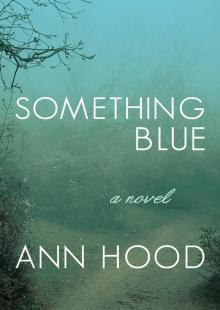 Something Blue
Something Blue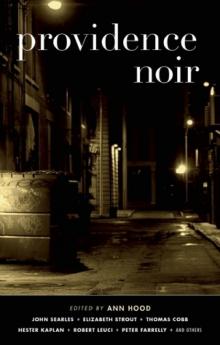 Providence Noir
Providence Noir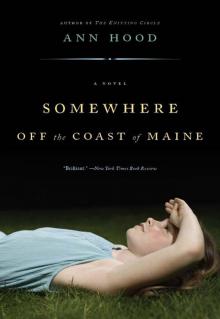 Somewhere Off the Coast of Maine
Somewhere Off the Coast of Maine Jewel of the East
Jewel of the East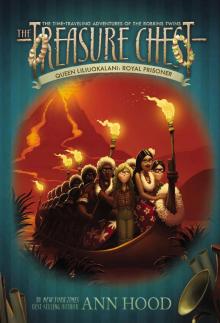 Queen Liliuokalani: Royal Prisoner
Queen Liliuokalani: Royal Prisoner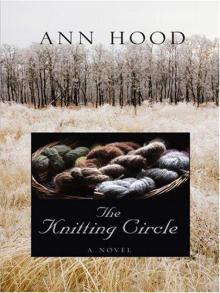 The Knitting Circle
The Knitting Circle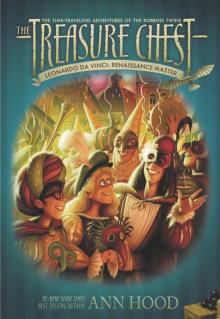 Leonardo da Vinci: Renaissance Master
Leonardo da Vinci: Renaissance Master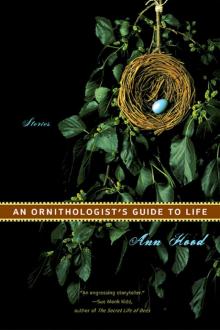 An Ornithologist's Guide to Life
An Ornithologist's Guide to Life The Red Thread
The Red Thread She Loves You (Yeah, Yeah, Yeah)
She Loves You (Yeah, Yeah, Yeah)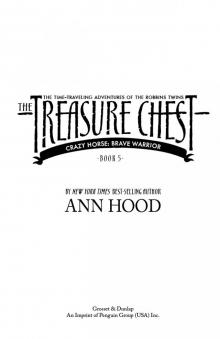 Brave Warrior
Brave Warrior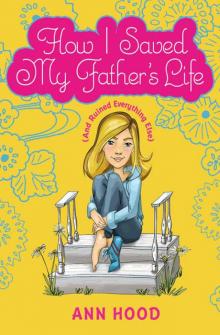 How I Saved My Father's Life (and Ruined Everything Else)
How I Saved My Father's Life (and Ruined Everything Else) An Italian Wife
An Italian Wife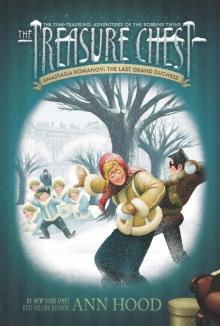 Anastasia Romanov: The Last Grand Duchess #10
Anastasia Romanov: The Last Grand Duchess #10 Prince of Air
Prince of Air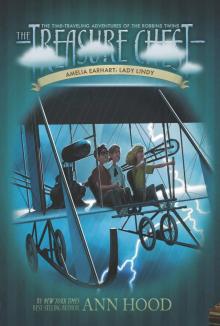 Amelia Earhart: Lady Lindy
Amelia Earhart: Lady Lindy Places to Stay the Night
Places to Stay the Night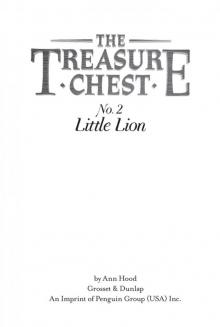 Little Lion
Little Lion Comfort
Comfort Angel of the Battlefield
Angel of the Battlefield